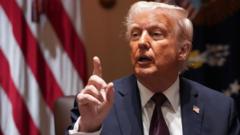As tensions rise, American allies express frustration and explore retaliatory measures against the U.S. for newly imposed tariffs that could threaten economic stability.
America's Allies Brace for Economic Fallout from New Tariffs

America's Allies Brace for Economic Fallout from New Tariffs
Trump's auto tariffs spark global trade war concerns among allied nations.
The unexpected decision by President Trump to levy a 25 percent tariff on imported cars and auto parts is rattling relations with America's allies and pressing them into a defensive posture.
Leaders from countries such as Canada, South Korea, Germany, Japan, and Mexico are voicing their concerns about the implications of these tariffs, which many perceive as an outright assault on established trade agreements. Canadian Prime Minister Mark Carney characterized Trump's actions as "a direct attack,” while Japanese Prime Minister Shigeru Ishiba suggested that all options were being considered in response to protect Japan's national interests.
Negotiations over these tariffs are spiraling towards heightened nationalism and may eventually lead to a trade war, threatening economic growth worldwide and exacerbating inflationary pressures. This could further complicate the already delicate security negotiations between Washington and its allies.
The Trump administration appears determined to leverage all aspects of American power, including military support, to secure what it views as more favorable trade agreements. Economists caution that the anticipated job growth in the U.S. car manufacturing sector might take years to materialize, while other sectors could experience significant job losses. This marks a crucial inflection point for countries that have historically relied on American promises of economic partnership and defense.
Leaders from countries such as Canada, South Korea, Germany, Japan, and Mexico are voicing their concerns about the implications of these tariffs, which many perceive as an outright assault on established trade agreements. Canadian Prime Minister Mark Carney characterized Trump's actions as "a direct attack,” while Japanese Prime Minister Shigeru Ishiba suggested that all options were being considered in response to protect Japan's national interests.
Negotiations over these tariffs are spiraling towards heightened nationalism and may eventually lead to a trade war, threatening economic growth worldwide and exacerbating inflationary pressures. This could further complicate the already delicate security negotiations between Washington and its allies.
The Trump administration appears determined to leverage all aspects of American power, including military support, to secure what it views as more favorable trade agreements. Economists caution that the anticipated job growth in the U.S. car manufacturing sector might take years to materialize, while other sectors could experience significant job losses. This marks a crucial inflection point for countries that have historically relied on American promises of economic partnership and defense.






















